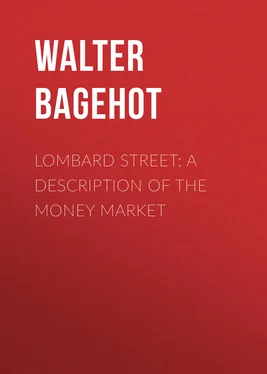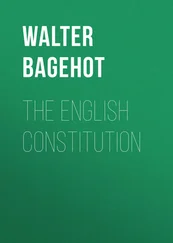Walter Bagehot - Lombard Street - A Description of the Money Market
Здесь есть возможность читать онлайн «Walter Bagehot - Lombard Street - A Description of the Money Market» — ознакомительный отрывок электронной книги совершенно бесплатно, а после прочтения отрывка купить полную версию. В некоторых случаях можно слушать аудио, скачать через торрент в формате fb2 и присутствует краткое содержание. Жанр: foreign_prose, История, foreign_edu, foreign_antique, на английском языке. Описание произведения, (предисловие) а так же отзывы посетителей доступны на портале библиотеки ЛибКат.
- Название:Lombard Street: A Description of the Money Market
- Автор:
- Жанр:
- Год:неизвестен
- ISBN:нет данных
- Рейтинг книги:4 / 5. Голосов: 1
-
Избранное:Добавить в избранное
- Отзывы:
-
Ваша оценка:
- 80
- 1
- 2
- 3
- 4
- 5
Lombard Street: A Description of the Money Market: краткое содержание, описание и аннотация
Предлагаем к чтению аннотацию, описание, краткое содержание или предисловие (зависит от того, что написал сам автор книги «Lombard Street: A Description of the Money Market»). Если вы не нашли необходимую информацию о книге — напишите в комментариях, мы постараемся отыскать её.
Lombard Street: A Description of the Money Market — читать онлайн ознакомительный отрывок
Ниже представлен текст книги, разбитый по страницам. Система сохранения места последней прочитанной страницы, позволяет с удобством читать онлайн бесплатно книгу «Lombard Street: A Description of the Money Market», без необходимости каждый раз заново искать на чём Вы остановились. Поставьте закладку, и сможете в любой момент перейти на страницу, на которой закончили чтение.
Интервал:
Закладка:
And not only does this unconscious 'organisation of capital,' to use a continental phrase, make the English specially quick in comparison with their neighbours on the continent at seizing on novel mercantile opportunities, but it makes them likely also to retain any trade on which they have once regularly fastened. Mr. Macculloch, following Ricardo, used to teach that all old nations had a special aptitude for trades in which much capital is required. The interest of capital having been reduced in such countries, he argued, by the necessity of continually resorting to inferior soils, they can undersell countries where profit is high in all trades needing great capital. And in this theory there is doubtless much truth, though it can only be applied in practice after a number of limitations and with a number of deductions of which the older school of political economists did not take enough notice. But the same principle plainly and practically applies to England, in consequence of her habitual use of borrowed capital. As has been explained, a new man, with a small capital of his own and a large borrowed capital, can undersell a rich man who depends on his own capital only. The rich man wants the full rate of mercantile profit on the whole of the capital employed in his trade, but the poor man wants only the interest of money (perhaps not a third of the rate of profit) on very much of what he uses, and therefore an income will be an ample recompense to the poor man which would starve the rich man out of the trade. All the common notions about the new competition of foreign countries with England and its dangers—notions in which there is in other aspects much truth require to be reconsidered in relation to this aspect. England has a special machinery for getting into trade new men who will be content with low prices, and this machinery will probably secure her success, for no other country is soon likely to rival it effectually.
There are many other points which might be insisted on, but it would be tedious and useless to elaborate the picture. The main conclusion is very plain—that English trade is become essentially a trade on borrowed capital, and that it is only by this refinement of our banking system that we are able to do the sort of trade we do, or to get through the quantity of it.
But in exact proportion to the power of this system is its delicacy I should hardly say too much if I said its danger. Only our familiarity blinds us to the marvellous nature of the system. There never was so much borrowed money collected in the world as is now collected in London. Of the many millions in Lombard street, infinitely the greater proportion is held by bankers or others on short notice or on demand; that is to say, the owners could ask for it all any day they please: in a panic some of them do ask for some of it. If any large fraction of that money really was demanded, our banking system and our industrial system too would be in great danger.
Some of those deposits too are of a peculiar and very distinct nature. Since the Franco-German war, we have become to a much larger extent than before the Bankers of Europe. A very large sum of foreign money is on various accounts and for various purposes held here. And in a time of panic it might be asked for. In 1866 we held only a much smaller sum of foreign money, but that smaller sum was demanded and we had to pay it at great cost and suffering, and it would be far worse if we had to pay the greater sums we now hold, without better resources than we had then.
It may be replied, that though our instant liabilities are great, our present means are large; that though we have much we may be asked to pay at any moment, we have very much always ready to pay it with. But, on the contrary, there is no country at present, and there never was any country before, in which the ratio of the cash reserve to the bank deposits was so small as it is now in England. So far from our being able to rely on the proportional magnitude of our cash in hand, the amount of that cash is so exceedingly small that a bystander almost trembles when he compares its minuteness with the immensity of the credit which rests upon it.
Again, it may be said that we need not be alarmed at the magnitude of our credit system or at its refinement, for that we have learned by experience the way of controlling it, and always manage it with discretion. But we do not always manage it with discretion. There is the astounding instance of Overend, Gurney, and Co. to the contrary. Ten years ago that house stood next to the Bank of England in the City of London; it was better known abroad than any similar firm known, perhaps, better than any purely English firm. The partners had great estates, which had mostly been made in the business. They still derived an immense income from it. Yet in six years they lost all their own wealth, sold the business to the company, and then lost a large part of the company's capital. And these losses were made in a manner so reckless and so foolish, that one would think a child who had lent money in the City of London would have lent it better. After this example, we must not confide too surely in long-established credit, or in firmly-rooted traditions of business. We must examine the system on which these great masses of money are manipulated, and assure ourselves that it is safe and right.
But it is not easy to rouse men of business to the task. They let the tide of business float before them; they make money or strive to do so while it passes, and they are unwilling to think where it is going. Even the great collapse of Overends, though it caused a panic, is beginning to be forgotten. Most men of business think—'Anyhow this system will probably last my time. It has gone on a long time, and is likely to go on still.' But the exact point is, that it has not gone on a long time. The collection of these immense sums in one place and in few hands is perfectly new. In 1844 the liabilities of the four great London Joint Stock Banks were 10,637,000 L.; they now are more than 60,000,000 L. The private deposits of the Bank of England then were 9,000,000 L.; they now are 8,000,000 L. There was in throughout the country but a fraction of the vast deposit business which now exists. We cannot appeal, therefore, to experience to prove the safety of our system as it now is, for the present magnitude of that system is entirely new. Obviously a system may be fit to regulate a few millions, and yet quite inadequate when it is set to cope with many millions. And thus it may be with 'Lombard Street,' so rapid has been its growth, and so unprecedented is its nature.
I am by no means an alarmist. I believe that our system, though curious and peculiar, may be worked safely; but if we wish so to work it, we must study it. We must not think we have an easy task when we have a difficult task, or that we are living in a natural state when we are really living in an artificial one. Money will not manage itself, and Lombard street has a great deal of money to manage.
CHAPTER II
A General View of Lombard Street.
I
The objects which you see in Lombard Street, and in that money world which is grouped about it, are the Bank of England, the Private Banks, the Joint Stock Banks, and the bill brokers. But before describing each of these separately we must look at what all have in common, and at the relation of each to the others.
The distinctive function of the banker, says Ricardo, 'begins as soon as he uses the money of others;' as long as he uses his own money he is only a capitalist. Accordingly all the banks in Lombard Street (and bill brokers are for this purpose only a kind of bankers) hold much money belonging to other people on running account and on deposit. In continental language, Lombard Street is an organization of credit, and we are to see if it is a good or bad organization in its kind, or if, as is most likely, it turn out to be mixed, what are its merits and what are its defects?
Читать дальшеИнтервал:
Закладка:
Похожие книги на «Lombard Street: A Description of the Money Market»
Представляем Вашему вниманию похожие книги на «Lombard Street: A Description of the Money Market» списком для выбора. Мы отобрали схожую по названию и смыслу литературу в надежде предоставить читателям больше вариантов отыскать новые, интересные, ещё непрочитанные произведения.
Обсуждение, отзывы о книге «Lombard Street: A Description of the Money Market» и просто собственные мнения читателей. Оставьте ваши комментарии, напишите, что Вы думаете о произведении, его смысле или главных героях. Укажите что конкретно понравилось, а что нет, и почему Вы так считаете.












